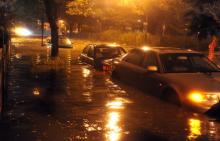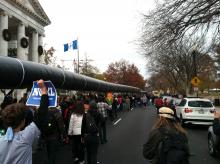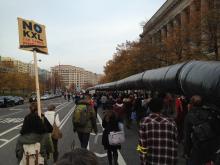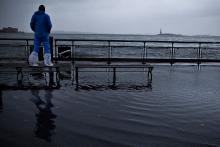Creation Care
During his second inaugural address, President Obama reframed protecting the environment as a command from God. Slate reports this reframing “transcends not only partisanship but the divide between those who believe in science and those who doubt science but believe in God.” Obama said:
"The path towards sustainable energy sources will be long and sometimes difficult. But America cannot resist this transition; we must lead it. We cannot cede to other nations the technology that will power new jobs and new industries — we must claim its promise. That is how we will maintain our economic vitality and our national treasure — our forests and waterways; our croplands and snowcapped peaks. That is how we will preserve our planet, commanded to our care by God. That's what will lend meaning to the creed our fathers once declared."

THE FINGER LAKES region of western New York is one of the most beautiful places on earth. The 11 lakes dangle like a necklace below Lake Ontario, surrounded by hills that are a breathtaking green in summer, red and orange for a flash in the autumn, then snowy white until the cycle repeats. It’s an area where the main tension has been of the resident-vs.-renter sort.
This summer, the tension, visibly staked out with lawn signs, was different. The topic: hydraulic fracturing, “fracking” for short. In this process, fluid—primarily water, with some sand and other chemicals—is injected deep underground to break apart shale rock, releasing natural gas and oil. Back at the surface, gas and oil are cleaned and sold; the water mixture is dumped into deep wells.
The procedure has only been made cost-effective in the last decade or so; awareness of retrievable shale oil and gas deposits isn’t a whole lot older. Combine the two, and you have an energy boom—one that led natural gas to nearly overtake coal for electricity production at one point last year.
A key question that has not been definitively answered: Does fracking, compared to the fuel it displaces, increase or decrease greenhouse gas production? Since natural gas, compared to coal, produces significantly less carbon dioxide when burned, cheaper natural gas is one reason why U.S. carbon dioxide emissions have gone down significantly of late. But natural gas is primarily methane—a gas that is more than 20 times as effective at trapping heat as carbon dioxide. During the fracking process, some of that methane escapes into the atmosphere; there is debate over how much.
The fiscal cliff deal passed Tuesday included an one-year extension of a tax credit for the wind industry. The tax credit has encouraged investment in wind energy for the past two decades. USA Today reports:
[The tax credit extension] would allow any project that begins construction in 2013 to claim the credit, even if it goes online in 2014, according to industry insiders. The tax credit that expired Monday could be claimed only for projects that were up and running in 2012.
Read more here.
An offshore drilling rig owned by Shell is beached on an island in the Gulf of Alaska. The rig could cause environmental damage if fuel begins to leak. The New York Times reports:
The rig, the Kulluk, broke free from a tow ship in stormy seas and ran aground Monday night. The Coast Guard was leading an effort to keep its more than 150,000 gallons of diesel fuel and lubricants from spilling onto the rocky shoreline.
Read more here.

Some of my environmentally conscious friends have expressed concern about having a real Christmas tree in their house – it seems wasteful to cut down an entire tree just for a month or so of décor. After all, climate change is a huge problem, and its potential impacts on the world (most especially the poor) seem contrary to the Christmas spirit.
It’s not a new worry – Teddy Roosevelt actually banned the White House Christmas Tree during his time in office, as he was worried about the conservation implications of people running out to cut down the forest.
We can rest easy, though – the live Christmas tree industry that has developed since that time is actually a benefit to the global climate. Here’s why.

Nearly one-in-six people in the United States live in an area with unhealthful short-term levels of particle pollution. One in six. I was one of those one in six, growing up with moderate to severe asthma. I was hospitalized several times. My health was poor throughout my childhood and didn’t really show full significant improvement until after college.
It’s something I learned to deal with, not to focus on. Yet the truth is, I grew up in a part of the country with severe pollution. In our drive for cheap energy, society paid a social cost.
Luckily I grew up in a part of the world and during a time in history when medical advances kept pace with asthma, in my case just barely. My father also had asthma, as did his father before him. If I had grown up during my father’s time, I likely wouldn’t be here today. If I grew up in another part of the world I know I wouldn’t be here today.
The religious implications of climate change are becoming evermore clear, as the topic makes its way into mainstream America.
The Huffington Post reports:
Indeed, what role do religion and theology play in the accelerating conversation about climate change? This has been a banner year for extreme weather events -- from severe drought in the American Midwest to the wildfire siege in Colorado to the "Frankenstorm" of Hurricane Sandy fueled by a warming Atlantic Ocean -- which have helped the reality of climate change to register on the consciousness of most people.
Read more here.

I’ve been really lucky this month to hear some of my co-workers’ reflections on the social justice implications of their favorite Christmas carols. It’s been a great opportunity to reflect back on what it is we sing and celebrate each year, the truths we profess without even knowing it.
Naturally, I wanted to get involved, as well. As I was running through the songs I love, "Joy to the World" suddenly popped up in a new light:
Joy to the World, the Lord is come!
Let Earth receive her King;
Let every heart prepare Him room,
And Heaven and nature sing,
And Heaven and nature sing,
And Heaven, and Heaven, and nature sing.
The Huffington Post reports:
In the holiday season, many of us reflect on what it is for which we are thankful. Naturally, we give thanks when things are going well, and even in a disaster we might be grateful that the catastrophe was not worse or that people stepped forward to render assistance. Claudius's poem presupposes a general climatic stability that for several centuries has been conducive to thankful worship.
But how does this optimistic hymn play in the era of radical climate change? How will it sound in the future, when each decade may bring yet more frequent and extreme climate events? What is the providential reading of "God's almighty hand" in a prolonged and life-threatening drought, or in the agrarian disaster of a dust bowl? When we are battered by a Hurricane Sandy or Katrina, how do we understand the majestic line about God in the Navy hymn, "Who bidd'st the mighty ocean deep its own appointed limits keep?"
Read more here.

Delegates from around the world are meeting in Doha, Qatar this month to discuss United Nations’ climate policy. In the past, these meetings were a source of hope for the environmental movement, as governments came together and committed to reducing emissions to collectively try to halt climate change.
Unfortunately, that is no longer the case.
Remember the Kyoto Protocol? Even though the reductions it mandated were nowhere near what’s required for us to reverse the trend we’ve started, we haven’t even come close to achieving those reductions. Oh yeah, and the United States didn’t even sign it.
The Protocol is expiring this year, and the U.N. Framework Commission on Climate Change (the body that created the Protocol — stick with me here) is trying in Doha to extend it for a couple years until they can reach an agreement on how to move forward.
So what’s holding the discussions back?

IF IT WASN'T the year from hell for the North American continent, it was the year from a place with a very similar temperature.
It's hard to remember, but it began with that bizarre summer-in-March heat wave that meteorologists described as one of the most anomalous weather events in the country's history. Before long there were record blazes burning in Colorado and New Mexico, and then a stifling heat wave moved east, triggering a "derecho" storm that raced almost 1,000 miles from Indiana to the Atlantic and left 5 million without power. July was the hottest month ever recorded in the United States; it was also when drought descended full force on the Midwest, stunting corn and soybeans and driving the world price of grain up by 40 percent (and making sure our hellish year became traumatic for poor people the planet round). By August it was clear we were in for a record melt year in the Arctic; when the long polar night finally fell, it was clear we'd essentially broken one of the planet's biggest physical features. And all that was before Sandy piled into our greatest urban area, leaving behind an indelible image of the future.
So the question becomes, what's an appropriate response? What even begins to match the magnitude of the trouble we face? What doesn't seem like spitting in the wind?
My sense is that the time has come to take on the fossil fuel industry itself—not the members of Congress they buy in droves each election season, but the real powers. Ignoring the damage they've already caused, these people spend hundreds of millions of dollars each day looking for new fossil fuels. And they spend hundreds of millions each year making sure no government stops them. They're like the tobacco industry at this point, except that instead of going after your lungs they're going after the lungs of the planet.

The Global North and West is addicted to fossilized fuel. Myself included. And we are trying to push our addictions onto the Global South.
Everywhere we look the fossil fuel pushers are in our face, luring us into our next fix.
Not a week after the elections, the American Petroleum Institute launched ads in Alaska, Louisiana, New Mexico, Colorado, Virginia, Arkansas, and North Carolina targeting U.S. senators who are raising the issue of climate change; specifically, the ones calling into question oil company subsidies.
The oil and gas companies try seduction ("fighting for jobs"). They try fear ("we are too big to fail"). They accuse us of being unfair to them ("Discriminatory treatment of the oil and gas industry is a bad idea"). They try bullying and slandering.
Even when our court system recently convicted one of them killing (BP convicted of "manslaughter" for the 11 murdered on Gulf Oil spill rigs), they are not stopped.

Midway through his nationwide, one-month Do The Math tour, Bill McKibben — author, environmental activist, and founder of 350.org — attracted a crowd that packed the Warner Theater in downtown Washington, D.C., on Sunday.
Joined both onstage and by video by a diverse group of speakers, including Rev. Lennox Yearwood of the Hip Hop Caucus, author Naomi Klein, and Archbishop Desmund Tutu, McKibben’s Do The Math tour brings to light the stark numbers of our current climate reality, first brought to the public’s attention in his viral article in Rolling Stone this past summer.
The three main numbers are as follows: 2 degrees Celsius is the maximum level of warming our planet can endure before real catastrophe occurs. To stay below 2 degrees C, we cannot burn more than 565 gigatons of carbon dioxide. But the problem is that the fossil fuel industry has 2,795 gigatons in their reserves — five times the safe amount to burn. As is their business plan, to reap the profit from these reserves, the fossil fuel companies plan on burning all of it, “unless we rise up to stop them” states the 350.org website.
James Balog and Jeff Orlowski, makers of the documentary film 'Chasing Ice' sit down with the "Morning Joe" MSNBC crew to discuss the implications of climate change and arctic ice melt. Check our our Sojo review of the film.
Visit NBCNews.com for breaking news, world news, and news about the economy
Mother Jones reports:
"Cap and trade" may be a dirty expression inside the DC Beltway, but as of today in California it's the law of the land. Gov. Jerry Brown has brushed aside dire warnings from the fossil fuel industry to forge ahead with the state's first-ever auction of emissions permits under its groundbreaking climate law, AB 32. This morning's auction marks the official launch of the world's second-largest carbon market.
At heart, the concept is elegantly simple. Suppose you wanted to persuade a group of 10 pack-a-day smokers to cut back, and you controlled the cigarette supply. In the beginning, you'd provide the group with 200 cigarettes (10 packs) a day, which they'd have to bid for. That's the "cap." Then, each month, you would reduce each person's daily allottment of smokes, gradually lowering the cap. The people who managed to smoke less could sell their extras to the more hard-core smokers for whatever they were willing to pay. That's the "trade" part.
Read more here.
On Saturday, Sojourners sent a group of staff members sailing down the Anacostia River.
But this was no pleasure trip.
Dottie Yunger, from the Anacostia Watershed Society, teamed up with Sojourners’ Creation Care campaign to teach some of our staff and a few other members of the local community about the state of the Anacostia river, how we as people of faith can be better stewards of our God-given resources, and how we can help create a healthier system where all creatures (both human and non-human) can survive and flourish.
Here are a few reflections from the trip.
The Guardian reports:
For Americans concerned about the environment, disaster was avoided on Tuesday. President Obama – with his somewhat lackluster record, if decidedly more exalted rhetoric, on global warming – defeated the Republican challenger who had vowed to gut federal emissions standards, and kill loan programs and tax breaks for green energy companies.
But activists say that it would be wrong to read the election as a stamp of approval for four more years of business as usual. They argue that voters have sent a clear signal that they want more aggressive action on the environment during the president's second term.
Read more here.

Photographer James Balog has a story for you, and it might be one you haven’t heard before. Starting in 2005, he and a team of adventurous photographers set out to provide visual, undeniable evidence for climate change. What they found he described as “decrepit old men falling into the earth and dying:” glaciers worldwide disappearing at record rates.
The film Chasing Ice is the story of their Extreme Ice Survey as they place time-lapse cameras on glaciers in Greenland, Iceland, Montana, and Alaska, and watch as they disappear. The public does not want statistics, they say. The public is being misled to believe that scientists do not agree on climate change. The public is losing interest but needs to pay attention.
As Balog and his team will tell you, the memory cards in their cameras contain the memories of the landscape, a “limitless universe of forms,” that will never be seen again. Man-made climate change (as documented by ice cores from the very glaciers that may not exist in a few years) is fundamentally altering our geology.

It is not surprising that our purely secular “environmental” movements have played out their ability to change society. For the changes we need to undertake are not only technological and political, but deeper and more difficult. They call on us to shape new institutions and new values.
When God’s Wind shattered Pharaoh’s power at the Red Sea, it was only the beginning of the creation of a new society. It took 40 years of struggle, of transformation and mistake, backsliding and grumbling, to ready a people that could live in a sacred relationship with each other, with the Earth, and with the Breath of Life.
So even if we were to shatter the gross and domineering political and economic power of our modern pharaohs, the giant corporations of Big Oil, Big Coal, Big Unnatural Gas that will not relent from over-burning and overpowering us, we would still need to be growing what religions claim to offer: a new vision of our lives.

Editor's Note: Sojourners offices, which are based in Washington, D.C., will be closed due to the weather. We pray for the safety of our staff, neighbors, and all those affected by this storm.
God, we pray for all those along the East Coast in the path of Hurricane Sandy. Grant safety to all, including the first responders. We pray for all those who will lose electricity and whose homes may be been damaged. But we pray especially for those who have no homes and no shelters in times such as these. We ask that your hand would protect them and keep them safe. May our paths cross with theirs so that we might have an opportunity to love and serve them. Amen.
"O Lord of LIght" by the Innocence Mission